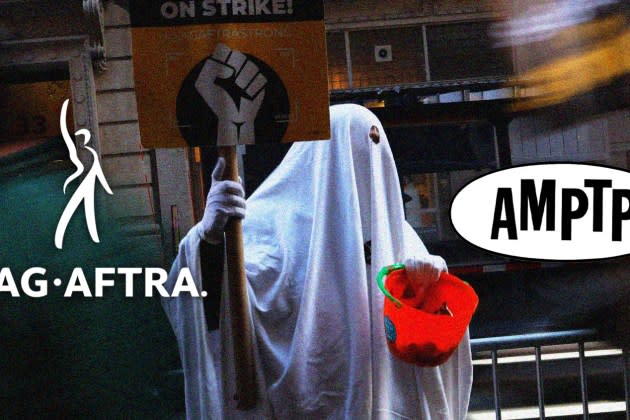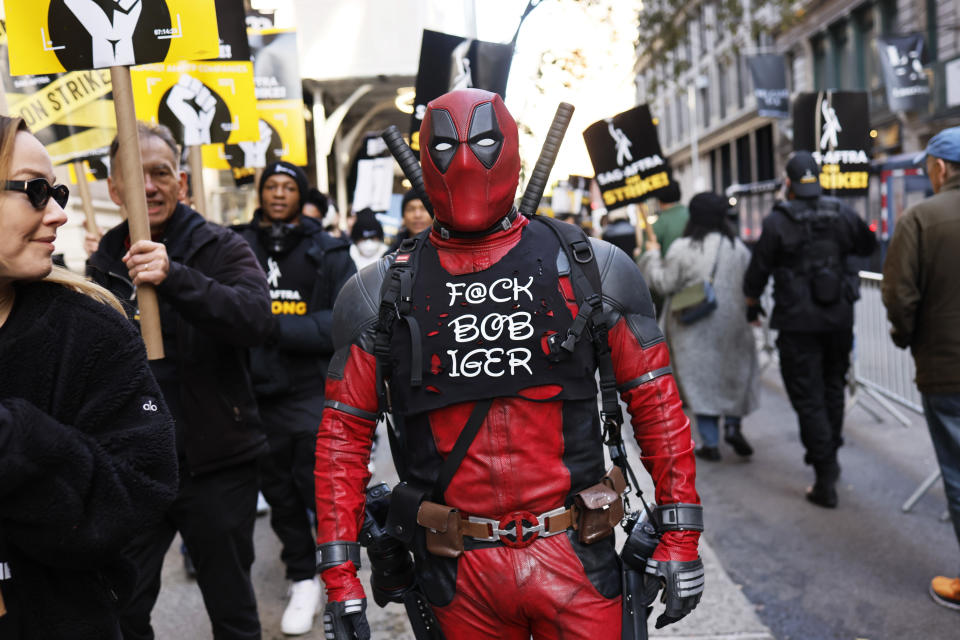No Trick, No Treat: SAG-AFTRA & AMPTP End Talks For Day, Will Resume Wednesday

EXCLUSIVE: It will be neither trick nor treat tonight as SAG-AFTRA and the studios plan to continue talking over the next few days in search of a deal to end the 110-day strike that has become a Hollywood nightmare.
Deliberations between the actors guild and the AMPTP are over for the day, we hear.
More from Deadline
SAG-AFTRA Interim Agreements: Full List Of Movies And TV Series
"Far Apart On Key Issues": SAG-AFTRA Sets Halloween Talks With Studios - Update
On this Halloween, the parties started mid-morning and stopped around 2 p.m. PT, as scheduled. Sources on both sides tell Deadline the guild and the AMPTP plan more talks Wednesday, November 1. More deliberations into the latter part of the week are penciled in if necessary, a source close to the talks informs us.
“This is where people earn their salaries, it’s the hard work of making sure everyone has something to walk away with,” an industry insider says of the last few days of negotiations, noting there’s “still a lot to do” before a new three-year contract is sealed.
Neither SAG-AFTRA nor the AMPTP responded to request for comment by Deadline on the state of the talks. If and when they do, we will update this post.
Back in conversation on Tuesday after working “independently” on October 30, the actors guild’s chief negotiator Duncan Crabtree-Ireland led direct virtual talks with AMPTP boss Carol Lombardini. Simultaneously, breakout groups of lawyers and other specialists drilled down into the details on specific items.

Against the backdrop of Halloween, those conversations were going on as hundreds of guild members, many dressed up, heeded SAG-AFTRA’s call and took to the streets in LA and NYC Tuesday — some even defying the guild’s much mocked directives of last week on not wearing “costumes inspired by struck content” and taking a swipe at the studio CEOs simultaneously.

In the cross-union solidarity we’ve seen throughout this now 110-day strike and the previous and now settled action by the WGA, leaders of AFL-CIO, the Women’s National Basketball Players Association and National Football League Players Association joined SAG-AFTRA on the picket lines Tuesday.
Despite a second round of renewed talks that began on October 24, a missive last night from the guild to members asserted that SAG-AFTRA and the studios remain “far apart on key issues.” Predominate among those keys issues is AI and what has been termed “success-based compensation” for the cast of successful streaming shows and movies, we’re told.
Still, dampening expectations of a quick deal this week, sources of both sides have expressed “cautious optimism” about the state of things and where the talks are going.
The perception was that the weekend accomplished a greater meeting in the middle on success-based compensation for performers on streaming series, with SAG-AFTRA’s most reported ask to studios before Friday being a 9% increase in minimums. The AMPTP had upped their previous offer from the 5% they negotiated with the WGA to 7% for the actors guild, who originally were asking for 11%. Studios sources believed that once the streaming revenue share portion of the new contract had been settled, then terms on AI would come easy. Not so fast.
As Crabtree-Ireland told Deadline Monday on the pickets, ““People seem to think we’re at a point where we’re just dotting I’s and crossing T’s.” The guild leader went on to clarify: “That’s not the situation; there are substantive issues, we’re still working hard to bridge real gaps.”
While studio sources informed Deadline that they had made ‘substantive and revolutionary” concessions on AI from the onset, and that there was “nothing strikable” per one insider, SAG-AFTRA never, ever saw it that way, adamant about the protection of likenesses for extras and “informed consent” for all performers particularly as it related to franchisable content. In short, an extra couldn’t be just paid once and have their image re-used in perpetuity by a studio.
In what many speculated could have been a celebration rally in the making, SAG-AFTRA have shut down activity at all other LA studios and set tomorrow at Disney as a Unity Picket. The guild’s November 1 focus on Disney comes on the same day that the Mouse House and Comcast can officially begin the pricey process of one or the other buying up the rest of Hulu — a cost that is widely expected to be more than $10 billion for Disney if they make the first move.
With that context, studios are sweating when it comes restarting incomplete feature productions, some already crewed up abroad to start shooting once news of a new deal breaks.
The question is whether SAG-AFTRA will repeat what the WGA did and allow members to go back to work during the contract ratification process. It’s not an easy feat for a 160,000-member union given its size, but a maneuver that was pulled off by studios and the WGA on that 12,000-member guild earlier this month.
If the actors guild does lift what is called the restraining order as a potential tentative contract is voted on, some of the movies ready to finish shooting include, but aren’t limited to Deadpool 3, Beetlejuice, Gladiator 2 and Mission: Impossible 8.
Also, on the top of studios’ list once a strike is called over: Finishing ADR on movies. Given the number of voiceovers in Sony’s next sequel Spider-Man: Beyond the Spider-Verse, the movie’s release date is to be determined. If finished, it could bring hundreds of millions to what is a starved 2024 that’s seen the subtraction of about $1.5 billion worth of global box office in Mission: Impossible 8, Snow White and Elios moving off the schedule. Gaps are beginning with spring movies like Quiet Place: Day One moving into summer, and an inconsistent amount of product to exhibition, such as in 2021 and 2022, will damage what has been a recouping business post Covid for cinemas which have been debt-laden.
Expressed Tearlach Hutcheson, VP, Film of Studio Movie Grill about the shifting 2024 theatrical schedule that “without a consistent supply, we’re allowing different habits to form and audiences wont’ be back in movie theaters.” He added: “It took a long time to get people back in movie theaters and if we don’t have product, we’ll have to start all over again.”
The harshest pain is perhaps felt among the below-the-line workers who’ve had to sell or mortgage their homes, and wipe through IRAs to survive as 45,000 jobs in the entertainment industry have been lost due to dual strikes over the past six months. Those job losses, as well as the loss of production and the carnage to vendors, has seen the California’s economy take a hit over $6.5 billion and counting from the ongoing labor actions.
Best of Deadline
2023 Premiere Dates For New & Returning Series On Broadcast, Cable & Streaming
TV Cancellations Photo Gallery: Series Ending In 2023 & Beyond
2023-24 Awards Season Calendar - Dates For Oscars, Emmys, Grammys, Tonys, Guilds & More
Sign up for Deadline's Newsletter. For the latest news, follow us on Facebook, Twitter, and Instagram.

